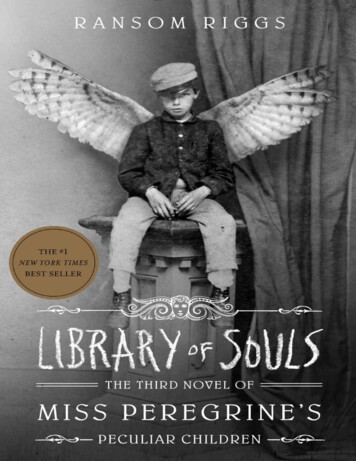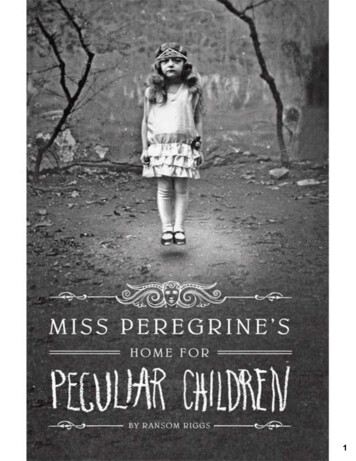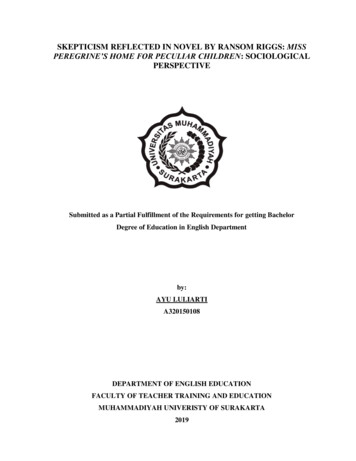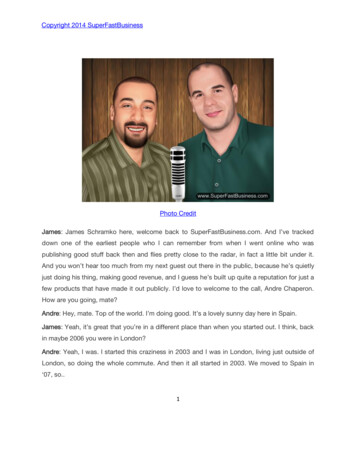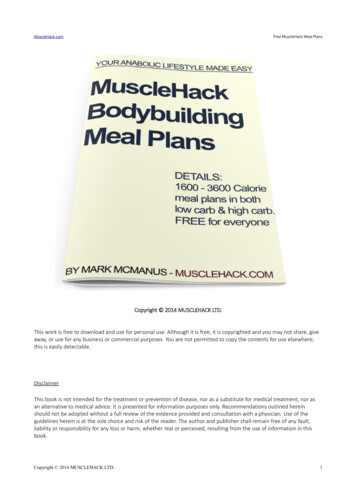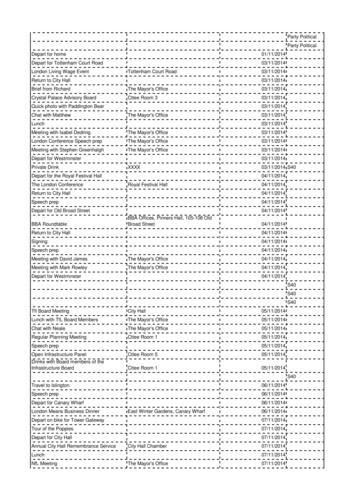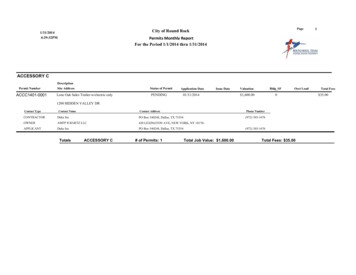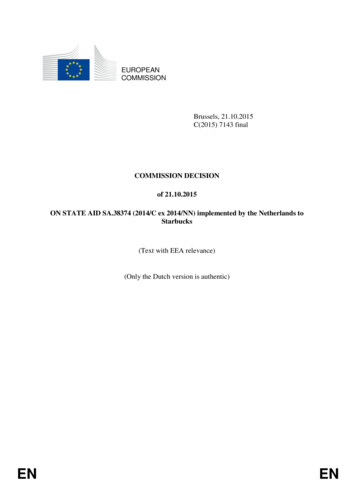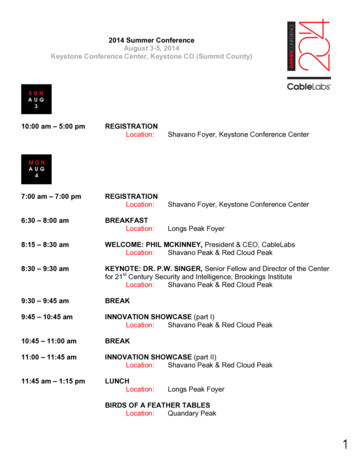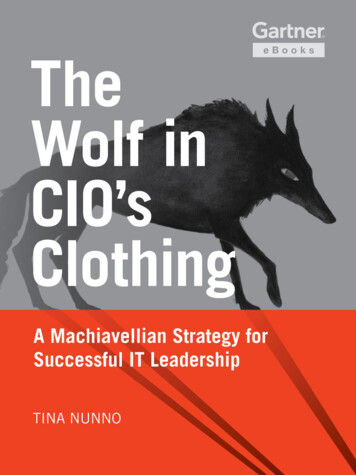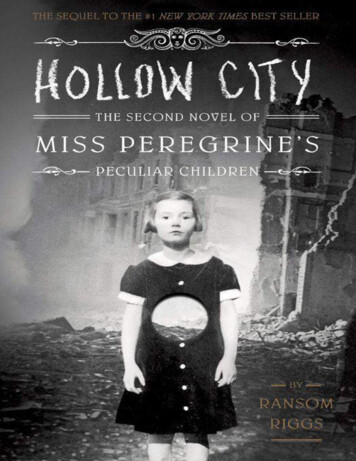
Transcription
Copyright 2014 by Ransom RiggsAll rights reserved. No part of this book may be reproduced in any form without written permission from the publisher.Library of Congress Cataloging in Publication Number: 2013914959eISBN: 978-1-59474-620-8Designed by Doogie HornerCover photograph courtesy of John Van Noate, Rex USA, and the Everett CollectionProduction management by John J. McGurkQuirk Books215 Church St.Philadelphia, PA 19106quirkbooks.comv3.1
FOR TAHEREH
ContentsCoverTitle PageCopyrightDedicationEpigraphPart OneChapter OneChapter TwoChapter ThreeChapter FourChapter FiveChapter SixChapter SevenPart TwoChapter EightChapter NineChapter TenChapter ElevenChapter TwelveChapter ThirteenAbout the PhotographyAbout the AuthorAcknowledgments
And lo! towards us coming in a boatAn old man, grizzled with the hair of eld,Moaning: “Woe unto you, debased souls!Hope nevermore to look upon the heavens.I come to lead you to the other shore;Into eternal darkness; into fire and frost.And thou, that yonder standest, living soul,Withdraw from these people, who are dead!”But he saw that I did not withdraw —Dante’s Inferno, Canto III
PECULIAR PERSONAEJACOB PORTMANOur hero, who can see and sense hollowgast
ABRAHAM PORTMAN(DECEASED)Jacob’s grandfather, killed by a hollowgastEMMA BLOOMA girl who can make fire with her hands, formerly involved with Jacob’s grandfather
BRONWYN BRUNTLEYAn unusually strong girlMILLARD NULLINGSAn invisible boy, scholar of all things peculiarHORACE SOMNUSSON
A boy who suffers from premonitory visions and dreamsOLIVE ABROHOLOS ELEPHANTAA girl who is lighter than airENOCH O’CONNORA boy who can animate the dead for brief periods of time
HUGH APISTONA boy who commands and protects the many bees that live in his stomachFIONA FRAUENFELDA silent girl with a peculiar talent for making plants grow
CLAIRE DENSMOREA girl with an extra mouth in the back of her head; the youngest of Miss Peregrine’speculiar childrenALMA LEFAY PEREGRINEYmbryne, shape-shifter, manipulator of time; headmistress of Cairnholm’s loop; arrestedin bird form
ESMERELDA AVOCETAn ymbryne whose loop was raided by the corrupted; kidnapped by wights
NONPECULIAR PERSONAEFRANKLIN PORTMANJacob’s father; bird hobbyist, wannabe writerMARYANN PORTMANJacob’s mother; heiress to Florida’s second-largest drugstore chainRICKY PICKERINGJacob’s only normal friendDOCTOR GOLAN(DECEASED)A wight who posed as a psychiatrist to deceive Jacob and his family; later killed byJacobRALPH WALDO EMERSON(DECEASED)Essayist, lecturer, poet
We rowed out through the harbor, past bobbing boats weeping rust from theirseams, past juries of silent seabirds roosting atop the barnacled remains of sunkendocks, past shermen who lowered their nets to stare frozenly as we slipped by,uncertain whether we were real or imagined; a procession of waterborne ghosts, orghosts soon to be. We were ten children and one bird in three small and unsteady boats,rowing with quiet intensity straight out to sea, the only safe harbor for miles recedingquickly behind us, craggy and magical in the blue-gold light of dawn. Our goal, therutted coast of mainland Wales, was somewhere before us but only dimly visible, aninky smudge squatting along the far horizon.We rowed past the old lighthouse, tranquil in the distance, which only last night hadbeen the scene of so many traumas. It was there that, with bombs exploding around us,we had nearly drowned, nearly been torn apart by bullets; that I had taken a gun andpulled its trigger and killed a man, an act still incomprehensible to me; that we had lostMiss Peregrine and got her back again—snatched from the steel jaws of a submarine—though the Miss Peregrine who was returned to us was damaged, in need of help wedidn’t know how to give. She perched now on the stern of our boat, watching thesanctuary she’d created slip away, more lost with every oar stroke.Finally we rowed past the breakwater and into the great blank open, and the glassysurface of the harbor gave way to little waves that chopped at the sides of our boats. Iheard a plane threading the clouds high above us and let my oars drag, neck craning up,arrested by a vision of our little armada from such a height: this world I had chosen, andeverything I had in it, and all our precious, peculiar lives, contained in three splinters ofwood adrift upon the vast, unblinking eye of the sea.Mercy.
* * *Our boats slid easily through the waves, three abreast, a friendly current bearing uscoastward. We rowed in shifts, taking turns at the oars to stave o exhaustion, though Ifelt so strong that for nearly an hour I refused to give them up. I lost myself in therhythm of the strokes, my arms tracing long ellipses in the air as if pulling somethingtoward me that refused to come. Hugh manned the oars opposite me, and behind him, atthe bow, sat Emma, her eyes hidden beneath the brim of a sun hat, head bent toward a
map spread across her knees. Every so often she’d look up from her map to consult thehorizon, and just the sight of her face in the sun gave me energy I didn’t know I had.I felt like I could row forever—until Horace shouted from one of the other boats to askhow much ocean was left between us and the mainland, and Emma squinted backtoward the island and then down at her map, measuring with spread ngers, and said,somewhat doubtfully, “Seven kilometers?” But then Millard, who was also in our boat,muttered something in her ear and she frowned and turned the map sideways, andfrowned again, then said, “I mean, eight and a half.” As the words left her mouth, I feltmyself—and saw everyone else—wilt a little.Eight and a half kilometers: a journey that would’ve taken an hour in the stomachchurning ferry that had brought me to Cairnholm weeks ago. A distance easily coveredby an engine-powered boat of any size. One and a half kilometers less than my out-ofshape uncles ran on odd weekends for charity, and only a few more than my motherboasted she could manage during rowing-machine classes at her fancy gym. But theferry between the island and the mainland wouldn’t start running for another thirtyyears, and rowing machines weren’t loaded down with passengers and luggage, nor didthey require constant course corrections just to stay pointed in the right direction. Worsestill, the ditch of water we were crossing was treacherous, a notorious ship-swallower:eight and a half kilometers of moody, changeable sea, its oor fanned with greeningwrecks and sailors’ bones and, lurking somewhere in the fathoms-deep darkness, ourenemies.Those of us who worried about such things assumed the wights were nearby,somewhere below us in that German submarine, waiting. If they didn’t already knowwe’d ed the island, they’d nd out soon enough. They hadn’t gone to such lengths tokidnap Miss Peregrine only to give up after one failed attempt. The warships thatinched along like centipedes in the distance and the British planes that kept watchoverhead made it too dangerous for the submarine to surface in broad daylight, butcome nightfall, we’d be easy prey. They would come for us, and take Miss Peregrine,and sink the rest. So we rowed, our only hope that we could reach the mainland beforenightfall reached us.* * *We rowed until our arms ached and our shoulders knotted. We rowed until themorning breeze stilled and the sun blazed down as through a magnifying glass andsweat pooled around our collars, and I realized no one had thought to bring fresh water,and that sunblock in 1940 meant standing in the shade. We rowed until the skin woreaway from the ridges of our palms and we were certain we absolutely couldn’t rowanother stroke, but then did, and then another, and another.“You’re sweating buckets,” Emma said. “Let me have a go at the oars before you meltaway.”Her voice startled me out of a daze. I nodded gratefully and let her switch into the oarseat, but twenty minutes later I asked for it back again. I didn’t like the thoughts that
crept into my head while my body was at rest: imagined scenes of my father waking ton d me gone from our rooms on Cairnholm, Emma’s ba ing letter in my place; thepanic that would ensue. Memory- ashes of terrible things I’d witnessed recently: amonster pulling me into its jaws; my former psychiatrist falling to his death; a manburied in a co n of ice, torn momentarily from the next world to croak into my earwith half a throat. So I rowed despite my exhaustion and a spine that felt like it mightnever bend straight again and hands rubbed raw from friction, and tried to think ofexactly nothing, those leaden oars both a life sentence and a life raft.Bronwyn, seemingly inexhaustible, rowed one of the boats all by herself. Olive satopposite but was no help; the tiny girl couldn’t pull the oars without pushing herself upinto the air, where a stray gust of wind might send her ying away like a kite. So Oliveshouted encouragement while Bronwyn did the work of two—or three or four, if youtook into account all the suitcases and boxes weighing down their boat, stu ed withclothes and food and maps and books and a lot of less practical things, too, like severaljars of pickled reptile hearts sloshing in Enoch’s du el bag; or the blown-o frontdoorknob to Miss Peregrine’s house, a memento Hugh had found in the grass on our wayto the boats and decided he couldn’t live without; or the bulky pillow Horace hadrescued from the house’s aming shell—it was his lucky pillow, he said, and the onlything that kept his paralyzing nightmares at bay.Other items were so precious that the children clung to them even as they rowed.Fiona kept a pot of wormy garden dirt pressed between her knees. Millard had stripedhis face with a handful of bomb-pulverized brick dust, an odd gesture that seemed partmourning ritual. If what they kept and clung to seemed strange, part of mesympathized: it was all they had left of their home. Just because they knew it was lostdidn’t mean they knew how to let it go.After three hours of rowing like galley slaves, distance had shrunk the island to thesize of an open hand. It looked nothing like the foreboding, cli -ringed fortress I hadrst laid eyes upon a few weeks ago; now it seemed fragile, a shard of rock in danger ofbeing washed away by the waves.“Look!” Enoch shouted, standing up in the boat next to ours. “It’s disappearing!” Aspectral fog enshrouded the island, blanking it from view, and we broke from rowing towatch it fade.“Say goodbye to our island,” Emma said, standing and removing her big hat. “Wemay never see it again.”“Farewell, island,” said Hugh. “You were so good to us.”Horace set his oar down and waved. “Goodbye, house. I shall miss all your rooms andgardens, but most of all I shall miss my bed.”“So long, loop,” Olive sniffled. “Thank you for keeping us safe all these years.”“Good years,” said Bronwyn. “The best I’ve known.”I, too, said a silent goodbye, to a place that had changed me forever—and the placethat, more than any graveyard, would forever contain the memory, and the mystery, ofmy grandfather. They were linked inextricably, he and that island, and I wondered, nowthat both were gone, if I would ever really understand what had happened to me: what I
had become; was becoming. I had come to the island to solve my grandfather’s mystery,and in doing so I had discovered my own. Watching Cairnholm disappear felt likewatching the only remaining key to that mystery sink beneath the dark waves.And then the island was simply gone, swallowed up by a mountain of fog.As if it had never existed.* * *Before long the fog caught up to us. By increments we were blinded, the mainlanddimming and the sun fading to a pale white bloom, and we turned circles in the eddyingtide until we’d lost all sense of direction. Finally we stopped and put our oars down andwaited in the doldrummy quiet, hoping it would pass; there was no use going anyfarther until it did.“I don’t like this,” Bronwyn said. “If we wait too long it’ll be night, and we’ll haveworse things to reckon with than bad weather.”Then, as if the weather had heard Bronwyn and decided to put us in our place, itturn ed really bad. A strong wind blew up, and within moments our world wastransformed. The sea around us whipped into white-capped waves that slapped at ourhulls and broke into our boats, sloshing cold water around our feet. Next came rain,hard as little bullets on our skin. Soon we were being tossed around like rubber toys in abathtub.“Turn into the waves!” Bronwyn shouted, slicing at the water with her oars. “If theybroadside us we’ll ip for sure!” But most of us were too spent to row in calm water, letalone a boiling sea, and the rest were too scared even to reach for the oars, so insteadwe grabbed for the gunwales and held on for dear life.A wall of water plowed straight toward us. We climbed the massive wave, our boatsturning nearly vertical beneath us. Emma clung to me and I clung to the oarlock; behindus Hugh held on to the seat with his arms. We crested the wave like a roller coaster, mystomach dropping into my legs, and as we raced down the far side, everything in ourboat that wasn’t nailed down—Emma’s map, Hugh’s bag, the red roller suitcase I’dlugged with me since Florida—went flying out over our heads and into the water.There was no time to worry about what had been lost, because initially we couldn’teven see the other boats. When we’d resumed an even keel, we squinted into themaelstrom and screamed our friends’ names. There was a terrible moment of silencebefore we heard voices call back to us, and Enoch’s boat appeared out of the mist, allfour passengers aboard, waving their arms at us.“Are you all right?” I shouted.“Over there!” they called back. “Look over there!”I saw that they weren’t waving hello, but directing our attention to something in thewater, some thirty yards away—the hull of an overturned boat.“That’s Bronwyn and Olive’s boat!” Emma said.It was upside down, its rusty bottom to the sky. There
Miss Peregrine and got her back again—snatched from the steel jaws of a submarine— though the Miss Peregrine who was returned to us was damaged, in need of help we didn’t know how to give. She perched now on the stern of our boat, watching the sanctuary she’d created slip away, more lost with every oar stroke. Finally we rowed past the breakwater and into the great blank open, and the .
